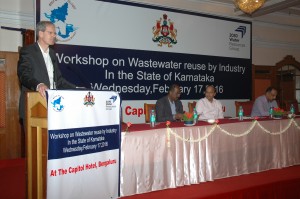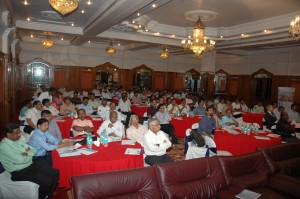Karnataka Stakeholders Deliberate on Policy for Urban Wastewater Reuse

Karnataka, India, February 17, 2016 – 2030 WRG has facilitated the establishment of a Committee to promote the reuse of treated municipal wastewater, particularly by industry, through the development of the requisite policy framework. The Committee includes the Urban Development Department, Government of Karnataka, as well as representatives from industry, civil society organizations, and academic experts.
In the State of Karnataka, a key Hydro-Economic Analysis facilitated by 2030 WRG[1] shows that the State will require twice as much water by 2030 as is consumed today, and that a business-as-usual approach will help meet only half of this requirement. The incremental cost of wastewater reuse is becoming more economical than primary supply augmentation from fresh surface water sources, when wastewater network systems and treatment plants are planned and designed for reuse and alternative fresh water sources are declining or unavailable.

The policy framework aims to address key constraints for the reuse of wastewater. In addition to lack of awareness on the opportunities and benefits of reuse, current pricing of water does not reflect economic externalities. It fails to account for the range of external costs associated with the conventional water cycle of abstraction, purification and discharge. Moreover, private sector initiative is crucial for supporting innovation, professional management, and improved operation and maintenance, which the policy aims to support.
The stakeholder deliberations are addressing regulatory, institutional and financial policy options needed to grow the market share of treated wastewater. The policy framework will be supplemented with institutional capacity for the implementation of concrete reuse projects.
[1]Creating a Sustainable Water Future for Karnataka- Urban and Industrial Sectors, Deloitte and 2030 Water Resources Group,2014
